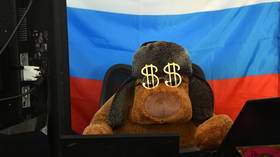Pelosi thinks two superpower leaders talking to each other is 'dangerous'
Just after reclaiming the gavel in the House, Nancy Pelosi (D-CA) has stoked anti-Russian sentiment and so-far unvindicated claims of collusion, calling the US president's contacts with Russian leader Vladimir Putin "dangerous."
Freshly reinstated as the third-most powerful person in the US government, Pelosi assumed an undiplomatic tone as she spoke with MSNBC's Joy Reid about a range of topics, including the Special Counsel Robert Mueller investigation, which has failed to unearth any damning evidence of collusion despite sending an array of Trump associates to jail on unrelated charges.
Following up on the 'Russiagate' probe, Reid asked Pelosi what she makes of the relationship between Putin and Trump.
‘Nothing short of treasonous’: Democrats, Republicans dump on #Trump after #Putin meeting https://t.co/fNL2LmbIBy
— RT (@RT_com) July 17, 2018
"I think that the president's relationship with thugs all over the world is appalling," Pelosi responded, receiving a thunderous round of applause from the audience that muffled her next words.
Vladimir Putin, really? Really? I think it's dangerous.
READ MORE: Moscow controls Trump? Nonsense, it’s a ‘witch hunt,’ says Putin’s spokesman
The US and Russian leaders have met twice, first in Helsinki in July and briefly on the sidelines of the G20 summit in Buenos Aires, Argentina, in early December. Both meetings attracted quite a lot of attention, stirring up anti-Russian sentiment and rumors of collusion between the Trump campaign and the Kremlin. In the wake of the Helsinki summit, Democrats and even some hardline Republicans picked on Trump for cozying up to Putin, calling his behavior "nothing short of treasonous." Mainstream media, incensed over the fact that neither Putin nor Trump attacked each other during the final press conference, branded the US leader's performance "disgraceful" and "a political victory for the Kremlin."
Awash with criticism following his first encounter with his Russian counterpart, Trump cancelled planned bilateral talks with Putin at the G20, citing a standoff between Ukrainian and Russian military ships in the Kerch Strait. They still had a brief conversation that lasted between 10 and 15 minutes.
Trump and the Kremlin have repeatedly denied any allegations of collusion, with both calling the protracted Russia probe a "witch hunt." Trump, who once said that he might end up having a "good relationship" with Putin, blamed "fake news media" for pushing for a major confrontation between Washington and Moscow that could pave the way for an all-out war.
However, Trump also said that nobody has been "tougher" than him on Russia. His administration has imposed additional sanctions on Moscow, expelling 60 Russian diplomats and closing the Russian consulate in Seattle, while giving Ukraine $10 million extra in military aid.
In July, Trump said that while "getting along with Putin is positive, not a negative," he could turn into Russia's "worst enemy" if the re-engagement with Moscow fails.
Think your friends would be interested? Share this story!















